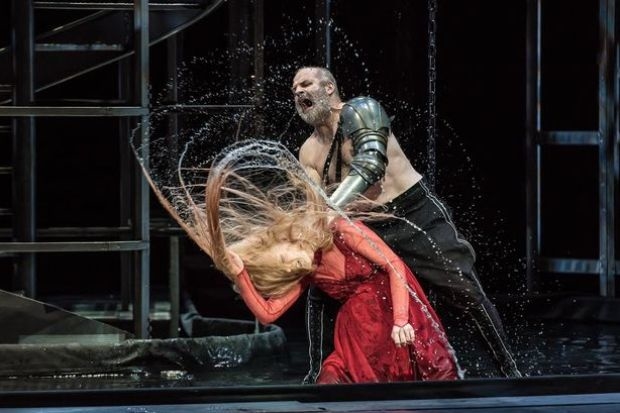Pelléas et Mélisande (Wales Millennium Centre – tour)

© Clive Barda
It’s the ultimate blank canvas opera, a masterpiece of interiority and abstraction, and thus a gift for an imaginative director. Easy to muck about with, easier still to muck up, it’s no surprise that the three best accounts of Pelléas to reach London in recent years have all been concert performances.
Visually, Pountney’s settings (credited to the late Johan Engels) are recycled from his 2013 production of Berg’s Lulu. His rationale for this seems tenuous – "both works explore a character […] who is more of a 'spirit' or 'force' than a conventional 'character'", he has said – but no matter: it’s a good look and it’ll have saved the company a bob or two. This time he’s added a giant skeleton, a circular puddle and so many ideas that the Maeterlinck-Debussy original groans under the weight of accretion.
WNO’s spring season is called ‘A Terrible Innocence’, yet by the end of act four the titular lovers are rutting away in consonance with the heady orchestration. Therein lies a clue to the concept: Debussy’s impressionism meets Pountney’s expressionism, and what we see is not to be taken literally. Their apparent adultery (for Mélisande is married to Pelléas’s brother, Golaud) is actually a distortion seen through the eye of a cuckold – just as Mélisande’s sensuous Rapunzel moment when she lets down her hair to her lover is, here, the erotic dream of a slumbering Pelléas. Golaud’s later assertion that the couple’s behaviour had in fact been platonic, "Ils s'étaient embrassés comme des petits enfants", is a grudging admission of the truth.
a compelling proposition
It would be hard to imagine a better sung, played or conducted Pelléas et Mélisande than this. Jacques Imbrailo and Jurgita Adamonyté as the young lovers are fevered and fervent, the ideal lyrical match for one another, while Christopher Purves fulminates and fantasises with even-toned eloquence as Golaud. Yet all three characters bristle with unspoken complications, and for a supposedly static opera it’s alive with hyperactive undercurrents. By some miracle of synthesis, the multiple psychological strands that Pountney intertwines are drawn together by music director Lothar Koenigs and the WNO Orchestra into a luminous, coalescent interpretation.
Leah-Marian Jones and Scott Wilde are no less engaging as the elders, Geneviève and Arkel, while if Golaud’s son Yniold has to be played by a woman then Rebecca Bottone‘s your man, or will be if she can rein in some excessive Pinocchio gesturing.
Notwithstanding its frustrations (and I’m still puzzling over Mélisande’s chrysalis birth in a bloodied dress: a reference to life beginning at menstruation, I’m guessing) the production offers a compelling proposition, grippingly lit by Mark Jonathan, and a musical performance of the utmost distinction.
There are further performances of Pelléas et Mélisande at the Wales Millennium Centre on 4 & 6 June, and at the Birmingham Hippodrome on 13 June










